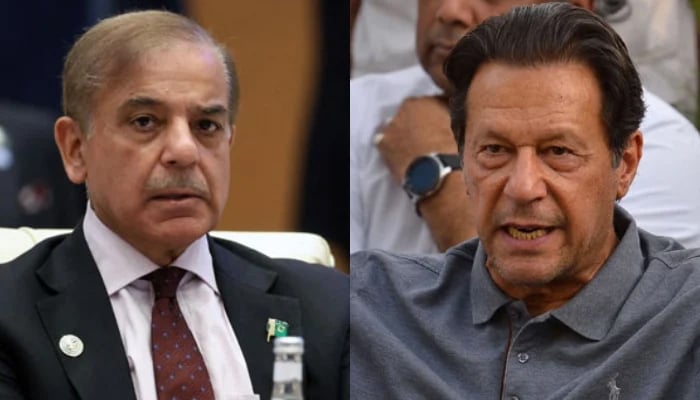Imran Khan, PM Shehbaz exchange blame for current economic crisis
PTI chief says economy in "freefall"; premier says Khan "conveniently forgets his own role"
Prime Minister Shehbaz Sharif blasted former premier and Pakistan Tehreek-e-Insaf (PTI) Chairman Imran Khan Monday for criticising the incumbent government's economic policies, saying that he had "conveniently forgotten his own role".
Earlier today, Khan claimed that the economy was in a "freefall" due to the policies of the Pakistan Democratic Movement (PDM) government.
Pointing to the widening gap between the interbank and open markets, Khan said the "dollarisation of economy" meant that there was no local or foreign investment. "The question is, how on earth is the Pakistani establishment allowing the country to head towards a complete economic meltdown?" the ex-premier asked.
Responding to the criticism, Shehbaz said the ex-premier's "understanding of the economy and the broader environment in which it operates is quite limited".
"[Khan] also conveniently forgets his own role in deepening economic challenges. From scrapping the IMF (International Monetary Fund) deal, he has always wished Pakistan to default. This is in addition to the adverse impact his politics of non-stop agitation, long marches, and dharna has had on the economy in terms of causing political instability," Shehbaz said in a tweet.
PM Shehbaz said Khan had "deliberately created an unstable environment" for investors, especially after the days-long violent riots that erupted after the PTI chief's arrest on May 9 in which public and private properties in several cities were damaged.
"The terrible events of May 9 alone have cost the economy billions of rupees and are an irrefutable endorsement of his nefarious designs. This is not to mention the plethora of corruption cases he is involved in," the prime minister said.
While acknowledging that Pakistan continues to face economic challenges, the incumbent prime minister said the country had already passed the "doomsday scenario".
The government was addressing the challenges through timely interventions and economic belt-tightening, the premier said, adding that it is also working with friends and partners to bridge the financing gaps where needed.
The government is making efforts to reduce the country's dependence on imports by increasing exports, investment and productivity, he added.
The exchange between the former and incumbent prime ministers comes as the $350 billion economy undergoes one of its worst financial crises.
The government has been in talks with the IMF for months for the release of a desperately needed economic bailout, without which Pakistan risks default. However, the stalled loan programme is yet to be revived.
Meanwhile, the country's foreign exchange reserves have dropped sharply to cover less than a month's imports. The State Bank of Pakistan (SBP) is denying or delaying opening letters of credit (LCs) for non-essential imports. However, companies across almost every sector have complained that it has led to inventory shortages and halted production.
-
Bitcoin crashes below $63K as regulatory pressure and market fears grow
-
Bitwise Crypto Industry innovators ETF: What investors should do in 2026?
-
Nintendo shares slide again as momentum fears grow
-
Gold, silver prices fallen sharply; What’s driving the drop?
-
Gold’s record climb: Experts question if its safety is ‘overstated’
-
Dubai unveils plans to construct street built with real gold
-
Netflix slams Paramount’s bid: 'Doesn't pass sniff test’ as Warner battle escalates
-
Ubisoft: Shares plunge amid restructuring plan and wave of games cancellations












